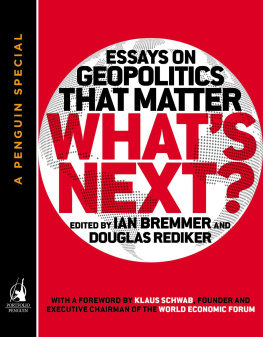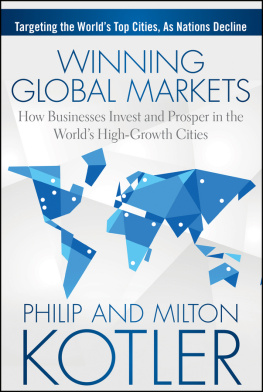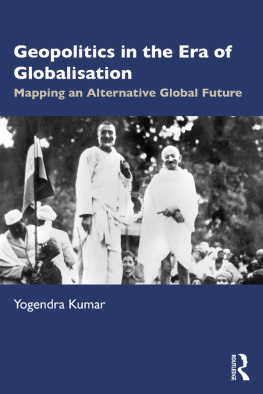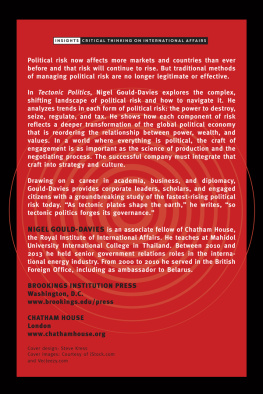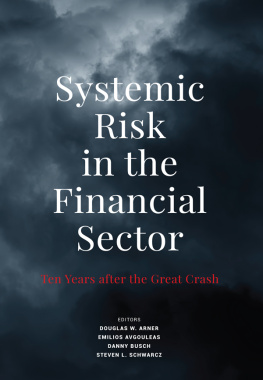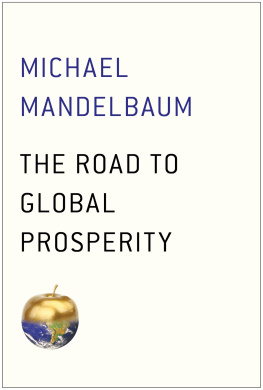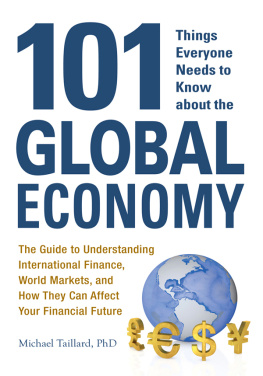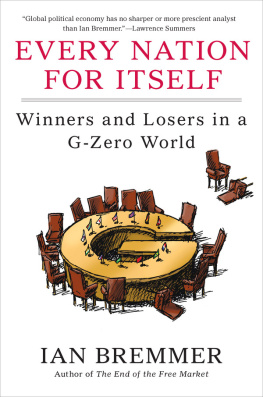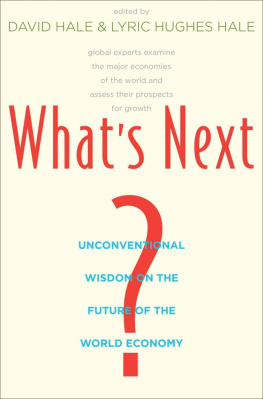CONTENTS
by Klaus Schwab
by Ian Bremmer and Douglas Rediker
Euro Zone: Can Euro-economics Survive Euro-politics?
By Antonio Barroso
International Management of Europes Financial Crisis: The Role of the Troika
By David Gordon and Douglas Rediker
Watching the Russian Wildcard
By Dmitri Trenin
The Arab Awakening: What Its Really All About
By Nader Mousavizadeh
Divergence: Leading Emerging Markets Are Headed in Different Directions
By Alexander Kliment and Christopher Garman
Asia Enters the Rapids: A Volatile Moment in a Crucial Region
By Ian Bremmer and Willis Sparks
Doubling Down on Economic Statecraft: Whats at Stake for the United States and the World America Built?
By Jennifer Harris
Afghanistan: Yet Again a Grave Geopolitical Risk?
By Nasim Zehra
A Perfect Storm for Global Governance: The Rise of Regionalism and Regional Institutions
By the Global Agenda Council on Geopolitical Risk
Also by
Ian Bremmer
EVERY NATION FOR ITSELF:
Winners and Losers in a G-Zero World
THE END OF THE FREE MARKET:
Who Wins the War Between States and Corporations?
THE FAT TAIL:
The Power of Political Knowledge in an Uncertain World
(with Preston Keat)
THE J CURVE:
A New Way to Understand Why Nations Rise and Fall
WHATS
NEXT
Essays on
Geopolitics That Matter
Edited by
Ian Bremmer and Douglas Rediker
Foreword by
Klaus Schwab
A PENGUIN SPECIAL
FROM PORTFOLIO

ABOUT THE BOOK
In the last four years, the world has suffered a financial market meltdown and subsequent global recession. The eurozone crisis looms, the Middle East is in turmoil, and a shifting power balance between emerging markets and developed economies is reordering the global economy as a whole. Political and economic challenges intertwine now more than ever before, as the demands of local politics and global business grow increasingly complex and begin to conflict in new ways. Facing these new challenges, what will the future hold?
In Whats Next, Ian Bremmer and Douglas Rediker, together with experts, analysts, and many of their colleagues from the World Economic Forums Global Agenda Council on Geopolitical Risk, analyze these global issues and provide a template to understand how they will change our world in the next few years. Focusing in on the most volatile, powerful, or misunderstood developments, the authors examine the risks to the International Monetary Fund, Russias future, the roles of emerging markets, and the future of U.S. foreign policy. They assess the political roots of the eurozone crisis, the key questions surrounding Afghanistan, important trends and tensions underway in Asia Pacific, and the rise of regionalism in the wake of fracturing international governance. Most importantly, they provide a reminder that our world is constantly changing and provide guidance on how to understand some of the key dynamics in the evolving global game.
PORTFOLIO/PENGUIN
Published by the Penguin Group
Penguin Group (USA) Inc., 375 Hudson Street, New York, New York 10014, USA
Penguin Group (Canada), 90 Eglinton Avenue East, Suite 700, Toronto, Ontario M4P 2Y3, Canada (a division of Pearson Penguin Canada Inc.)
Penguin Books Ltd, 80 Strand, London WC2R 0RL, England
Penguin Ireland, 25 St Stephens Green, Dublin 2, Ireland (a division of Penguin Books Ltd)
Penguin Group (Australia), 707 Collins Street, Melbourne, Victoria 3008, Australia
(a division of Pearson Australia Group Pty Ltd)
Penguin Books India Pvt Ltd, 11 Community Centre, Panchsheel Park, New Delhi 110 017, India
Penguin Group (NZ), 67 Apollo Drive, Rosedale, Auckland 0632, New Zealand (a division of Pearson New Zealand Ltd)
Penguin Books, Rosebank Office Park, 181 Jan Smuts Avenue, Parktown North 2193, South Africa
Penguin China, B7 Jaiming Center, 27 East Third Ring Road North, Chaoyang District, Beijing 100020, China
Penguin Books Ltd, Registered Offices:
80 Strand, London WC2R 0RL, England
First published in the United States of America by Portfolio/Penguin, a member of Penguin Group (USA) Inc. 2012
Copyright Eurasia Group and International Capital Strategies, LLC.
All rights reserved
ISBN 978-1-10162-196-7
While the authors have made every effort to provide accurate telephone numbers, Internet addresses, and other contact information at the time of publication, neither the publisher nor the authors assumes any responsibility for errors or for changes that occur after publication. Further, publisher does not have any control over and does not assume any responsibility for author or third-party Web sites or their content.
Without limiting the rights under copyright reserved above, no part of this publication may be reproduced, stored in or introduced into a retrieval system, or transmitted, in any form, or by any means (electronic, mechanical, photocopying, recording, or otherwise), without the prior written permission of both the copyright owner and the above publisher of this book.
The scanning, uploading, and distribution of this book via the Internet or via any other means without the permission of the publisher is illegal and punishable by law. Please purchase only authorized electronic editions and do not participate in or encourage electronic piracy of copyrighted materials. Your support of the authors rights is appreciated.

FOREWORD
In the wake of the global financial crisis, we have come to a critical crossroads. We can now reflect on the events of 2008 and 2009 with enough distance to provide perspectivebut we remain in a moment of transition as our global systems and institutions face challenges that are both fundamental and fast-moving. The need for a global agenda is beyond dispute. Our most pressing challenges must be addressed collectively if we are to overcome them.
The risk that geopolitical conflict will upset that agenda is more apparent than at any point in recent history. After decades characterized by accelerating globalization, we are now witnessing deglobalization. This dynamic is taking place alongside a broader shift in political and economic power from the developed to the developing world, expressed in the many bonds that connect us politically, economically, and socially. But the fact that globalization is no longer the worldwide norm and underlying driver of growth does not mean our world is any less interconnected. On the contrary, nations are becoming ever more interdependent. Increasingly, we share the same media of communication, seek the same natural resources, and face the same transnational threats, whether from climate change or nuclear proliferation. This dividebetween the splintering of global governance and the increasingly hyperconnected worldis at the root of the challenges we face.
What are the implications of this phenomenon? What changes can we expect? We see a new regionalism that, in some cases, sharpens a wide range of international challenges, many of which are the focal points for our Global Agenda Councils at the World Economic Forum (WEF). This trend is both geographic and thematic, as governance, crisis response, and many vital geopolitical and economic questions will continue to receive less attention than they deserveand will increasingly be addressed in a piecemeal fashion at a regional level.

